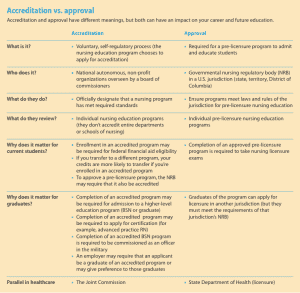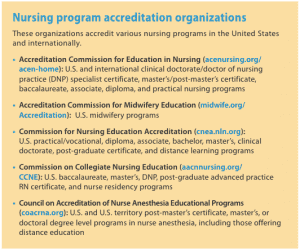What you know can benefit your career.
Approval and accreditation are important nursing education program designations, but many students and employers, as well as some faculty, lack a clear understanding of what they mean. This article explains some of the differences and the designations’ potential impact on your career. (See Accreditation vs. approval.)

What is approval?
The National Council of State Boards of Nursing (NCSBN)—an independent, nongovernmental, nonprofit organization—requires that new graduates complete an approved pre-licensure nursing education program before taking the nursing licensure exam (NCLEX-PN or NCLEX-RN).
This approval is granted by the nursing regulatory body (NRB) in the jurisdiction (state, territory, or the District of Columbia) where the program is located. The NCSBN defines NRBs (also called boards of nursing) as governmental organizations that protect public health and welfare by overseeing safe nursing practice, licensing and regulating nursing practice, and evaluating and enforcing pre-licensure education standards.
Among its many activities, the NCSBN has developed the nursing licensure examinations; the Nurse Licensure Compact; and The Consensus Model for APRN Regulation: Licensure, Accreditation, Certification, and Education. In most states, a new pre-licensure nursing program must secure approval of the NRB before enrolling students. The approval process may include reviewing a program directly. It also may require that the program be accredited. According to the NCSBN, about 50% of NRBs currently require accreditation of pre-licensure programs; more NRBs are expected to institute this requirement. NRBs have the authority to close programs that don’t meet standards, such as those that operate fraudulently or have high attrition or low licensure-exam pass rates.
When reviewing an application for initial RN licensure or RN licensure by endorsement, each NRB must verify graduation or eligibility for graduation from a member board approved prelicensure RN program. This gives nursing faculty considerable influence over determining which students are recommended to the public as being prepared for safe, competent practice. Seamless nurse mobility across jurisdictions requires that all NRBs make sound program approval decisions.
What is accreditation?
Accreditation is a process undertaken by an autonomous, nongovernmental organization to ensure nursing education programs are held to common standards of quality and demonstrate continuous improvement and program effectiveness. Unlike NRB approval, which is mandatory and pertains to pre-licensure programs only, accreditation is voluntary and may be sought for education programs from pre-licensure through doctorate. Five national organizations accredit nursing education programs. (See Nursing program accreditation organizations.)

Similar to NRB approval, accreditation helps to ensure all nurses, no matter where they’re educated, can perform their duties with the same level of competence. Although accreditation is voluntary, attending an accredited program offers important advantages to students or graduates. For example, some certifications (such as advanced practice RN) and employers may require accredited program completion.
How can I learn a program’s status?
Programs publish information about their NRB approval and accreditation status on their websites and in marketing materials. In addition, many NRBs and all accreditation organizations publish lists of approved and accredited programs. Keep in mind that approval and accreditation are designations for individual nursing education programs, not an entire department or school of nursing.
Implications for your future
If you’re applying to nursing education programs, check their approval and accreditation status. These designations have implications for financial aid, licensure, and your future employment and education.
Deborah Lindell is the Marvin E. and Ruth Durr Denekas Professor, assistant director of the DNP Program, and faculty development coordinator at Frances Payne Bolton School of Nursing, Case Western Reserve University in Cleveland, Ohio.
References
National Council of State Boards of Nursing. Differences Between BON Approval and Accreditation. 2012. ncsbn.org/Differences_between_BON_approval_and_accreditation.pdf
Spector N, Hooper JI, Silvestre J, Qian H. Board of nursing approval of registered nurse education programs. J Nurs Regul. 2018;8(4):22-31. doi:10.1016/S2155-8256(17)30178-3.


















